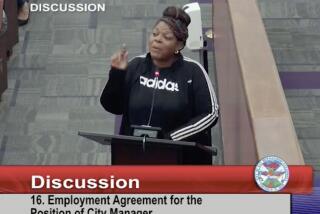IRVINE : Ask Not for Whom the Bell Tolls . . .
- Share via
When Florinda (Rusty) Reed appeared before the City Council recently, the bell tolled for her.
The bell, rung by the city clerk since June, told the 71-year-old grandmother that her five minutes allotted to address the council had expired. It was the first showdown over Mayor Sally Anne Sheridan’s new policy of enforcing time limits for public testimony that were established by the council in 1975.
For the record:
12:00 a.m. Sept. 15, 1990 For The Record
Los Angeles Times Saturday September 15, 1990 Orange County Edition Metro Part B Page 2 Column 2 Metro Desk 1 inches; 35 words Type of Material: Correction
Irvine council--A quote was incorrectly attributed in a story Friday about the Irvine City Council’s decision to stop using a bell to signal the time limit for public speakers. Councilman Barry J. Hammond did not support the move to stop using the bell.
After discussing the merits of a time limit for public speakers later in the meeting, the council decided informally to dispose of the bell.
For now, Sheridan said, she will try to keep an eye on the clock and keep people within their time limit without a dinging bell.
But the solution did not come in time for Reed.
After Sheridan silenced her for the first time, Reed, 71, shuffled through her notes and kept telling the council why it shouldn’t allow a Christmas tree to be erected outside of City Hall. She kept talking until Sheridan lifted her gavel to interrupt.
“I haven’t finished!” Reed interrupted her. “I haven’t finished, Mayor Sheridan.”
Reed went back to her speech but Sheridan interrupted again. It was already 10 p.m. and there were many speakers waiting to address the council, Sheridan told Reed. Everyone is allocated five minutes and it would be unfair to allow her to speak longer, she said.
“I plan to finish, Mayor Sheridan,” Reed replied. “I plan to finish my speech.”
“Excuse me,” Sheridan interrupted Reed again. “This is a council ordinance I have chosen to enforce. . . . We will have to ask the sergeant-at-arms to. . . .”
But before calling for Reed’s removal from the public microphone, City Atty. John L. Fellows whispered into Sheridan’s ear and Sheridan announced, “I will call a recess at this time.”
During the recess, Reed said she was upset that Sheridan didn’t call for her expulsion.
“That was a clever ploy,” she said after the council members left the room. “Their responsibility was to hear me out or their responsibility was to have the sergeant-at-arms remove me.”
Reed said she wanted to challenge the policy of cutting off the public. She was willing to be pulled away from the microphone rather than be silenced, she said. But during the recess, she decided to abandon her challenge of Sheridan’s authority. When the council returned, Reed was back in her audience seat, sitting quietly.
Restricting the public to five minutes per speaker allows the council to be fair to everyone, Sheridan said later. Before she was elected mayor, Sheridan said, former Mayor Larry Agran would cut people off if they disagreed with him but allowed people who shared his views to continue.
The time limit also speeds up meetings and saves the city money on overtime for city staff members attending the meetings, she said.
“Although the bell is offensive to some, it has allowed more people to testify on issues,” she said. Otherwise, when the meetings go late into the night, some people leave before getting their say, she said.
Later in the meeting, Councilwoman Paula Werner suggested that the council ban the bell.
Speaking in public before a televised City Council meeting isn’t easy, Werner said. The council should not make it any harder with “bureaucratic regulations and dinging of bells signaling their allotted minutes to speak,” she said.
Councilman William A. (Art) Bloomer sided with Werner.
“The most offensive thing we’ve done to enforce this (time limit) is the use of the bell,” Hammond said. Still, he said, the mayor should be allowed to cut people off for speaking too long.
More to Read
Sign up for Essential California
The most important California stories and recommendations in your inbox every morning.
You may occasionally receive promotional content from the Los Angeles Times.













